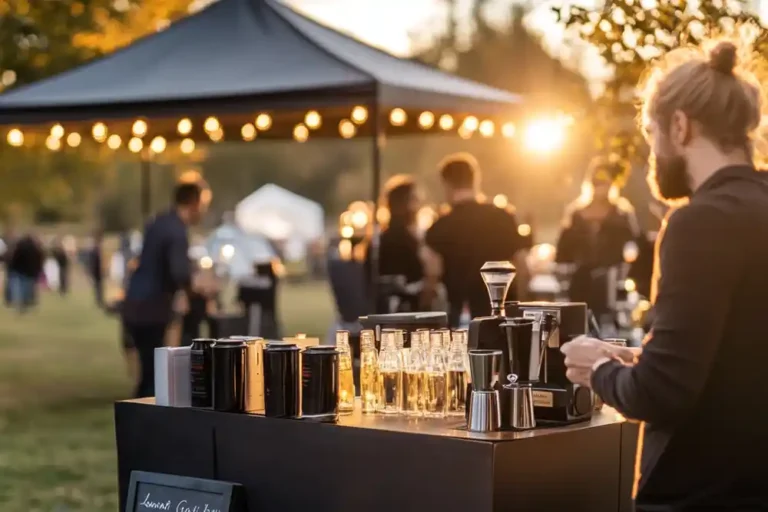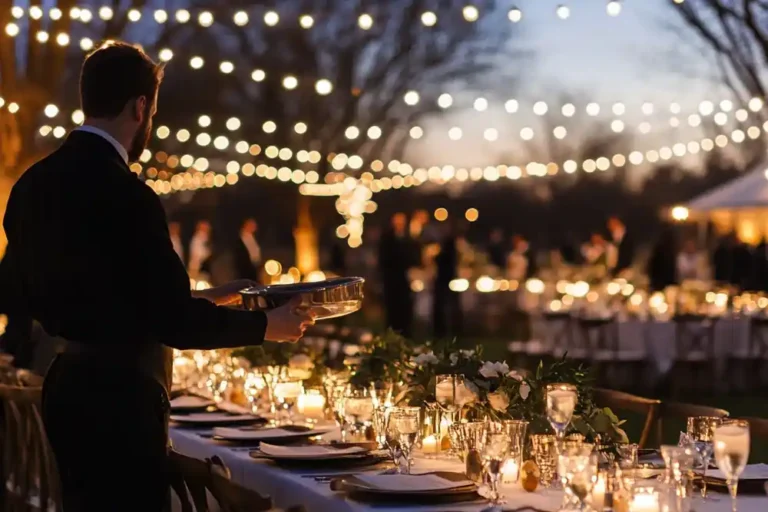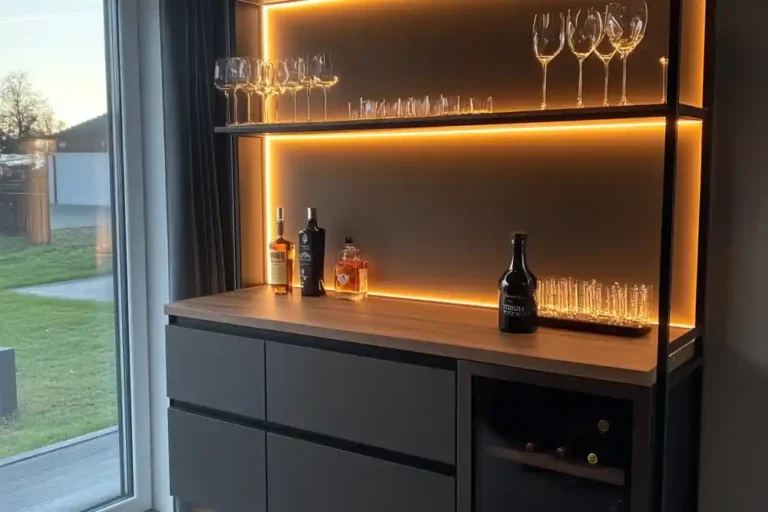Event Staff: Starting Your Career as a Private Bartender
The role of a private bartender has gained popularity as more people seek customized experiences for their events. Private bartenders provide services for various occasions, from weddings to corporate functions, offering unique cocktails and a distinctive bar setup.
This growing demand opens opportunities for those interested in bartending, and many clients are actively searching for “a private bartender near me” to bring a personal touch to their events. With the right private bartender prices that align with market expectations, bartenders can create memorable experiences for clients and guests, enhancing the overall impact of the event.
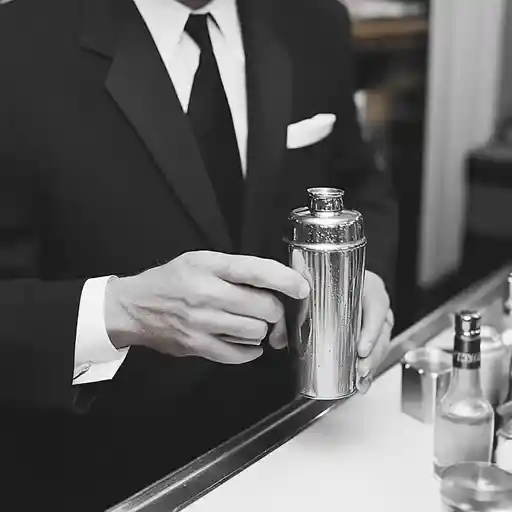
As the events industry continues to expand, aspiring bartenders have the chance to carve out a niche for themselves. With the right qualifications, training, and marketing strategies, individuals can successfully break into this field and establish a thriving business. Understanding the essential steps to become a private bartender can help set the foundation for a fulfilling and profitable career, especially as more people look for high-quality bartending services near them.
The Appeal of Working Private Events
The appeal of working private events goes beyond just flexible number of hours. According to the U.S. Bureau of Labor Statistics, as many as 21,300 bartending jobs are expected to open up between 2022 and 2032. Here’s why many bartenders are making the switch to private gigs:
- Higher Pay: On average, private bartenders can earn significantly more per hour compared to traditional event staff jobs in bars or restaurants. Private bartender prices can include gratuities or service fees, which add up, especially for larger events where hosts value premium service.
- Variety of Work: No two private events are the same. From intimate cocktail parties to large weddings, the variety keeps the work fresh and exciting. This diversity also allows bartenders to showcase their skills and adapt to different themes or guest preferences, which can be a great way to stand out in event staff jobs.
- Flexibility and Control: Working as a private bartender allows you to accept or decline jobs based on your schedule, giving you control over your work-life balance. You also have the freedom to build a client base that aligns with your interests, whether it’s weddings, corporate events, or high-end private parties.
Essential Qualifications to Become a Private Bartender and Get Event Staff Jobs
While bartending is often seen as a skill you can learn on the job, working as a private bartender requires more than just mixing drinks. Having the right certifications, training, and knowledge of regulations can help you stand out and ensure you’re legally covered for any event you take on.
Required Certifications and Training
To become a professional private bartender, the first step is ensuring you have the proper certifications. Most states in the U.S. require bartenders to complete a responsible beverage service program, such as TIPS (Training for Intervention Procedures) or ServSafe Alcohol, which educates bartenders on alcohol safety and service regulations. For those searching for a “private bartender near me” for events, these certifications reassure clients that the bartender understands essential safety and legal guidelines.
In addition to these certifications, many private bartenders opt for formal bartending training to gain a solid foundation in drink preparation, mixology, and customer service. While not always required, bartending school provides confidence, particularly if you’re new to the field.
Tips for Choosing the Right Bartending School
If you decide to pursue bartending school, it’s important to pick the right one. Before you start browsing the available options, here’s what to look for:
- Accreditation: Ensure the school is recognized by national or regional accrediting bodies. This ensures you’re receiving a quality education that will be recognized by potential clients or employers.
- Course Content: The curriculum should cover not only drink-making techniques but also bar management, customer service, and responsible alcohol service.
- Practical Experience: Look for programs that offer hands-on training behind the bar. This will give you valuable experience and help you feel prepared for real-world scenarios.
We recommend giving one of these top schools a shot to upskill yourself in private bartending:
- American Bartending School (New Jersey) – Offers hands-on training with real equipment, focusing on private event skills like custom cocktails and customer interaction.
- ABC Bartending School (various locations) – Known for flexible scheduling and beginner-friendly courses, ideal for mastering private event bartending essentials.
- National Bartenders School (California) – Emphasizes customer service and high-quality drink preparation, perfect for private bartending.
- New York Bartending School – Known for its authentic NYC-style training, this school builds expertise in upscale and private event bartending.
- Elite Bartending School (Miami) – Offers immersive event-based training, making it ideal for bartenders looking to work private parties and special events.
Licensing and Regulatory Bodies for Bartending in the US
Each state has its own licensing requirements for bartenders. It’s important to understand what is needed in your area to operate legally. In general, bartenders must complete training courses and may need to pass examinations to obtain their licenses. Familiarizing yourself with local laws can help you ensure compliance and avoid potential fines.
Additionally, some regions may have specific licensing for event caterers that serve alcohol. Understanding these regulations can aid you in setting up your business correctly and avoiding legal complications.
Navigating Local Alcohol Laws
Research your local and state laws regarding alcohol service at private events. Many areas require bartenders to obtain a permit before serving alcohol at large gatherings, especially if alcohol is being sold, such as at public events or ticketed functions.
By securing the right qualifications and understanding local regulations, you’ll not only protect yourself legally but also boost your credibility with clients and event planners.
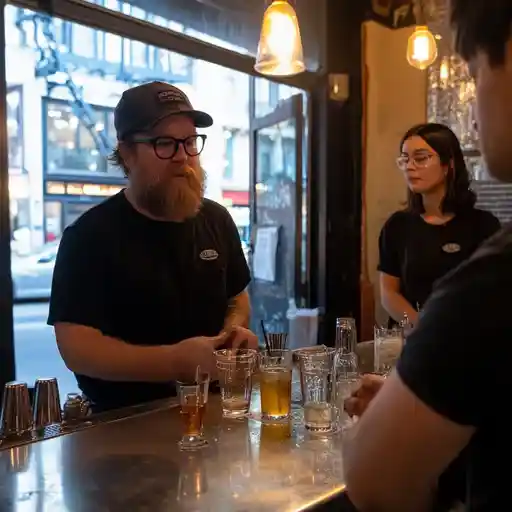
Setting Up Your Private Bartending Business
Starting your own private bartending business gives you the freedom to be your own boss, but like any business, it requires careful planning. Creating a business plan is crucial, outlining your services, pricing, target market, and financial projections. As you establish your brand, keeping an eye on event staff vacancies can help identify where private bartending services are in demand, allowing you to strategically market yourself.
According to a recent industry analysis, the U.S. event market is projected to reach a valuation of $538.6 billion by 2030, as demand for specialized services, including private bartending, continues to increase.
Creating a Business Plan
Think of your business plan as a roadmap—it helps guide your decisions and ensures you stay on track with your goals. You don’t need anything overly complicated, but at a minimum, consider the following:
- Define Your Services: Will you offer just bartending, or will you provide bar setups, custom cocktails, and glassware too? Being specific makes it easier to market yourself and set clear expectations for clients seeking a private bartender near me who offers comprehensive services for their events.
- Target Market: Are you focusing on weddings, corporate events, or private parties? Having a clear idea of your target market will help you align your services and pricing. This clarity can also be valuable when looking through event staff jobs to better understand what potential clients seek in a private bartender.
- Pricing Structure: Decide whether you’ll charge hourly, by event, or offer packages. Flexibility is key here, as different events may require different pricing models.
Managing Finances and Setting Rates
Once you’ve got your services and market in mind, the next step is figuring out how to manage your finances and set competitive private bartender rates.
- Start-Up Costs: From bartending equipment to marketing materials, expect some initial costs when setting up your business. You may also need a website, business cards, and possibly insurance, which can add up quickly.
- Setting Rates: Look at what other private bartenders in your area are charging to get a feel for market rates. For example, bartending rates typically range between $25 and $60 per hour, depending on experience and event type. You can adjust your pricing based on the event size, location, and services you provide, like custom cocktails or bringing your equipment. For example, starting with a mobile bar service for private events might require a bigger initial investment, but it’ll also attract more customers.
Factors Influencing Pricing Strategies
Here are a few things to keep in mind when deciding your rates:
- Event Type: A simple house party or a birthday party may require fewer skills and less equipment than a high-end wedding or corporate event, which could justify higher pricing.
- Location: Your rates may vary depending on the city or region you’re working in. Big cities typically have higher rates, while rural or suburban areas may require more competitive pricing.
- Additional Services: If you’re offering extras like custom cocktail menus, bar equipment rentals, or staff, don’t be afraid to charge accordingly. Clients are often willing to pay more for a full-service experience.

Marketing Yourself in the Event Industry
Effective marketing is crucial for establishing your private bartending business. A strong marketing strategy will help you stand out, build connections, and attract clients who value your unique skills.
Building Your Presence with Personal Promotion and Networking
One of the most effective ways to market yourself is by networking. Building relationships with event planners, venue owners, and other industry professionals can lead to steady work and valuable referrals. Here’s how to get started:
- Attend Industry Events: Whether it’s wedding expos, corporate gatherings, or hospitality trade shows, showing up at events can help you meet the right people. Always carry business cards and be ready to pitch your services.
- Partner with Event Planners: Event planners are constantly in need of reliable bartenders for their events. Reach out to local planners and experienced catering staff teams to offer your complementary services—you may even consider providing a discount for the first gig to establish a long-term relationship.
- Create a Website: Even a basic website that lists your services, rates, and contact information can make a big difference. It provides a professional face to your business and gives potential clients a place to learn more about you.
- Offer Referral Incentives: Encourage past clients to refer you by offering a small discount or gift card for every successful referral. Word of mouth can be one of the best ways to grow your business.
Leveraging Social Media to Reach Potential Clients
Social media is an essential tool for any private bartender looking to attract clients and grow their business. Platforms like Instagram and Facebook allow you to showcase your skills through photos of your cocktail creations, behind-the-scenes moments from events, and testimonials from happy customers.
In addition to the visual platforms, Reddit offers a great opportunity to join discussions in event-focused subreddits such as r/WeddingPlanning, r/batenders, or r/EventPlanners. Here, you can offer advice, share experiences, and subtly promote your services in response to questions from people planning events.
Don’t overlook LinkedIn either—it’s a prime platform for networking with event planners, venue managers, and corporate clients who may need your services. By regularly posting content and engaging in professional communities, you can position yourself as a trusted expert in the event industry and attract new business from those searching for bartenders.
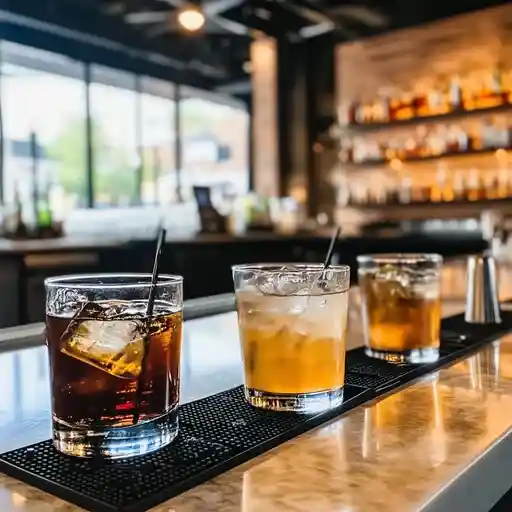
Finding Jobs and Event Staff Vacancies
Landing private bartender gigs is all about knowing where to look and building strong relationships in the event industry. Whether you’re just starting out or looking to expand your client base, here are some effective strategies for finding opportunities.
Platforms for Finding Private Bartender Gigs
Several online platforms specialize in connecting professional bartender with job opportunities, making it easier to find private event gigs:
- Indeed and ZipRecruiter: These job search sites often list event staff vacancies, including bartending jobs for private parties, weddings, and corporate events. Set up alerts so you’re notified whenever a relevant job is posted in your area.
- GigSalad: Specifically designed for event professionals, GigSalad connects bartenders, performers, and event staff with clients who are looking to hire for private events. Create a detailed profile and showcase your skills to attract potential clients.
- Thumbtack: Thumbtack allows you to list your services as a private bartender, and clients can request quotes for their events. This platform is popular for one-time gigs and small, private events, making it a great way to build your portfolio.
- Social Media Groups: Facebook groups and Reddit threads dedicated to event planning can also be valuable resources. Search for local groups where event organizers post vacancies or ask for recommendations.
Networking with Event Planners and Venue Owners
Building relationships with event planners and venue owners is one of the most effective ways to secure consistent work. Here’s how to network effectively:
- Attend Industry Events: Expos, hospitality trade shows, and networking mixers are ideal places to meet professionals in the event industry. Be prepared with business cards and a short pitch about your services.
- Collaborate with Event Planners: Many event planners prefer working with reliable bartenders they already know. Reach out to local planners, offering your services for upcoming events or even volunteering for smaller gigs to build trust and rapport.
- Partner with Venues: Some venues have preferred vendor lists for bartending services. If you build strong relationships with venue owners, they may add you to their list and refer you to clients directly.
By combining online platforms and in-person networking, you can expand your reach and secure a steady stream of private bartending , ambassador/expo service, and event staff jobs.

Enhancing Your Bartender Skill Set
To stand out as a private bartender, it’s essential to continuously develop your skills, both in drink-making and customer service. Building expertise in these areas will help you provide an exceptional experience for clients and keep them coming back for future events.
Developing Signature Cocktails
Creating signature cocktails is a great way to show your creativity and make your services memorable. Clients love when bartenders can offer unique drinks tailored to their event’s theme, season, or even their personal preferences. Experiment with new ingredients, flavors, and presentation styles to craft one-of-a-kind beverages that guests won’t forget. Having a few signature cocktails in your repertoire can set you apart from other bartenders and serve as a talking point during events.
Mastering Customer Service Skills for Private Events
As a private bartender, your interaction with guests is just as important as your ability to mix drinks. Weddings, corporate events, and private parties often come with different expectations, so it’s important to adjust your service style accordingly. Whether you’re catering to high-end clientele or hosting a laid-back backyard gathering, your ability to engage with guests in a friendly, professional manner is key. Practicing active listening, maintaining a positive attitude, and anticipating guests’ needs will enhance the overall experience.
Continuing Education and Professional Specializations to Consider
The bartending world is constantly evolving, with new techniques, trends, and tools always emerging. Staying up to date with the latest trends in mixology, wine knowledge, and even event bartending certifications can give you an edge in the industry. Consider taking advanced courses in mixology or becoming certified in wine and spirits. Specializations like craft cocktail-making, flair bartending, or sommelier training can help broaden your skill set and make you more appealing to clients seeking a premium experience.
FAQs
Should I market my bartending skills offline or online?
Both offline and online marketing strategies are essential for building a successful private bartending business. Online platforms like social media, websites, and job listing services can help you reach a wider audience quickly. However, offline marketing—such as attending local networking events, distributing business cards at expos, or partnering with venues—can create personal connections and word-of-mouth referrals, which are equally important. A balanced approach will maximize your visibility in the event industry.
How much should I typically charge for bartending at a private party?
Bartending rates depend on several factors, including your experience, event type, and location. Typically, private bartenders charge between $25 and $60 per hour, with higher rates for specialized services like custom cocktails or flair bartending. Always research the going rates in your area and consider the size of the event, the number of guests, and any additional services when setting your prices.
Is a private bartender expected to provide the alcohol, or will the host supply it?
In most cases, the event host provides the alcohol, but it’s important to clarify this with your client upfront. Some bartenders offer an all-inclusive service where they also provide the alcohol, mixers, and glassware. If you’re supplying the alcohol, make sure to factor this into your pricing and get any necessary permits, depending on local laws.
If I’m responsible for purchasing alcohol or additional supplies, how should I charge for these services?
When providing alcohol or supplies, it’s best to charge a flat fee or cost-plus pricing model. For a flat fee, include all alcohol, mixers, and supplies in your package price. In a cost-plus model, you charge the client the cost of alcohol plus a percentage for your services, which covers your time sourcing and purchasing. Be transparent about how you calculate these average costs to avoid misunderstandings.
Conclusion
Starting your journey as a private bartender can open doors to a flexible, rewarding career in the event industry. By honing your skills, marketing yourself effectively, and building strong relationships within the event community, you can carve out a successful business. This doesn’t mean it’s easy though. If you don’t approach the profession with a solid plan, you’ll often find yourself stuck doing menial work.
Starting as a private bartender can be tough. Between certifications, networking, and finding gigs, it’s easy to feel overwhelmed.
Without the right guidance, newcomers often struggle while seasoned bartenders secure the top jobs with ease. At Premier Staff, our expert team of seasoned bartenders makes it look easy, mastering every event with skill and professionalism.
Learn from the best and gain valuable insight into what it takes to succeed—get in touch with us today and start building a bartending career with confidence.





